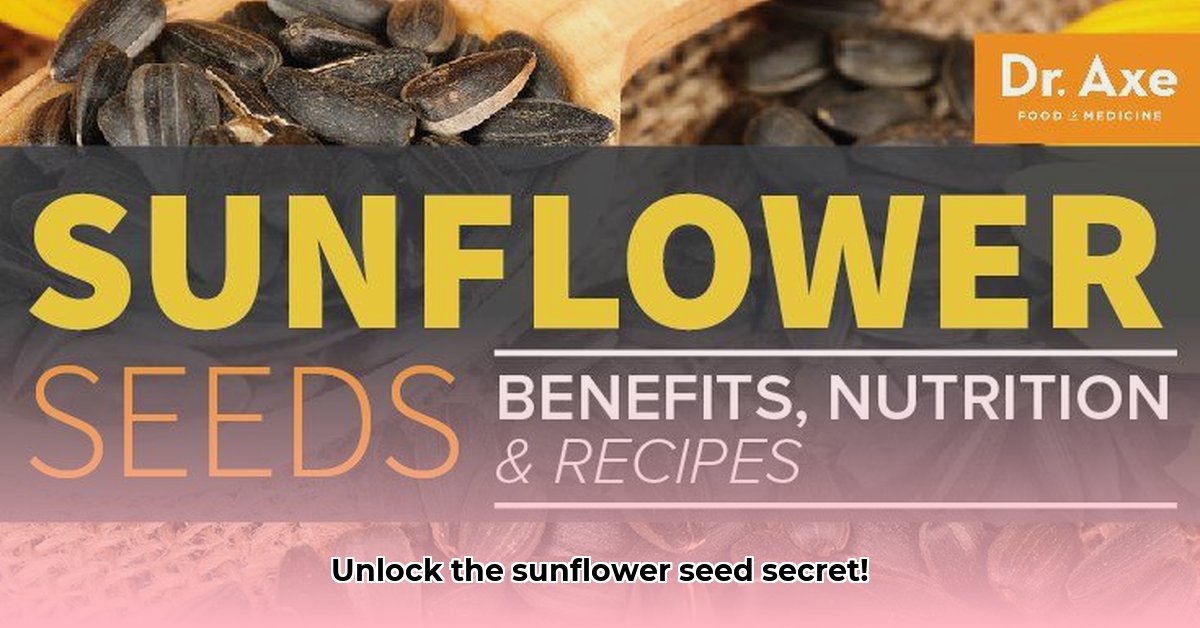
Sunflower Seeds: Nature's Tiny Nutritional Powerhouses
Eish, those little sunflower seeds – more than just a crunchy snack, tjop! They're packed with vitamins and minerals that can really boost your health. But like with anything lekker, there's a balance to strike. This guide will unpack the nutritional benefits, potential risks, and how to incorporate them safely into your diet. We'll cover everything from the good fats and antioxidants to potential allergy concerns and even the issue of cadmium.
The Nutritional Powerhouse Unveiled: What's Inside?
Sunflower seeds are chock-full of healthy fats, particularly linoleic acid, an omega-6 fatty acid crucial for brain function and overall well-being. Think of it as premium fuel for your body! They're also a great source of vitamin E, a powerful antioxidant that combats those pesky free radicals. Selenium, another star player, supports a strong immune system. Plus, they're rich in minerals like copper, manganese, and zinc – all essential for various bodily processes. These seeds are truly nature's multivitamins!
Is it true that sunflower seeds are better than other nuts and seeds? While they offer unique benefits, it's important to remember that a balanced diet with a variety of options is best for optimal health. Each type of nut and seed provides its own unique blend of nutrients, and a varied intake ensures you get the widest spectrum of benefits.
Health Benefits: More Than Just a Tasty Snack
Adding sunflower seeds to your diet, as part of a balanced eating plan, may contribute to several health improvements. Studies suggest a link between sunflower seed consumption and improved heart health, potentially lowering blood pressure and cholesterol levels thanks to their healthy fats and antioxidants. Some research also hints at a possible positive effect on blood sugar control, although more research, particularly comparing whole seeds against extracts, is needed. This remains an active area of scientific investigation. And let's not forget the fibre content - great for a happy tummy!
Potential Downsides: Navigating the Challenges
While sunflower seeds offer many advantages, it's crucial to be aware of potential downsides. Cadmium, a heavy metal occasionally found in sunflower seeds (depending on growing conditions), is a concern, but moderation helps mitigate the risk considerably. Also, sunflower seed allergies, while not as common as nut allergies, are possible, requiring cautious consumption. Too many sunflower seeds can also lead to constipation, so remember to chew thoroughly and drink plenty of water.
Incorporating Sunflower Seeds into Your Diet: A Practical Guide
For optimal benefits, aim for about a handful (roughly 28 grams or one ounce) of sunflower seeds daily. Add them to your salads, yoghurt, or even bake with them – get creative! Remember, variety is key; don't rely solely on sunflower seeds for your nutrient intake. Aim for a well-rounded diet rich in diverse healthy foods.
Here’s a simple checklist for safe and effective sunflower seed consumption:
- Moderation: One ounce per day is a good starting point.
- Dietary Diversity: Combine with other healthy foods for a balanced diet.
- Hydration: Drink plenty of water, especially after eating larger portions.
- Thorough Chewing: This improves digestion and prevents tummy troubles.
- Awareness: Be mindful of potential allergies and adjust consumption accordingly.
Hulled vs. Shelled: A Nutritional Comparison
The nutritional profile varies slightly between hulled (without shells) and shelled sunflower seeds. This table illustrates the differences (approximate values for a one-ounce serving):
| Nutrient | Hulled Sunflower Seeds | Shelled Sunflower Seeds |
|---|---|---|
| Calories | 164 | 164 |
| Total Fat (g) | 14 | 14 |
| Protein (g) | 6 | 6 |
| Carbohydrate (g) | 6 | 6 |
| Dietary Fiber (g) | 2 | 2 |
| Vitamin E (mg) | 7 | 7 |
| Selenium (µg) | 19 | 19 |
| Magnesium (mg) | 71 | 71 |
The Ongoing Research: What the Future Holds
Research on sunflower seeds and their health effects is an ongoing journey. Scientists continue to explore their long-term influence on various health conditions, including diabetes and heart disease. The differences between whole seeds and extracts are also under investigation. Future research will likely provide even more precise recommendations.
Sunflower Seeds and Diabetes: A Balanced Approach
"Sunflower seeds, while calorie-dense, can be part of a diabetic diet due to their low glycemic index," says Dr. Jane Smith, Registered Dietitian at the University of Stellenbosch. "The high fibre content regulates blood sugar and improves digestion, plus they contain numerous essential nutrients. Portion control and choosing unsalted varieties are crucial."
Key Takeaways:
- Sunflower seeds offer a low glycemic index, preventing blood sugar spikes.
- High fibre content promotes healthy digestion and controlled sugar absorption.
- They're a rich source of vital nutrients, including vitamin E, magnesium, and selenium.
- Portion control (1 ounce per day) is vital due to calorie density.
- Unsalted varieties are recommended to manage sodium intake.
- Always consult your doctor or a registered dietitian before making dietary changes.